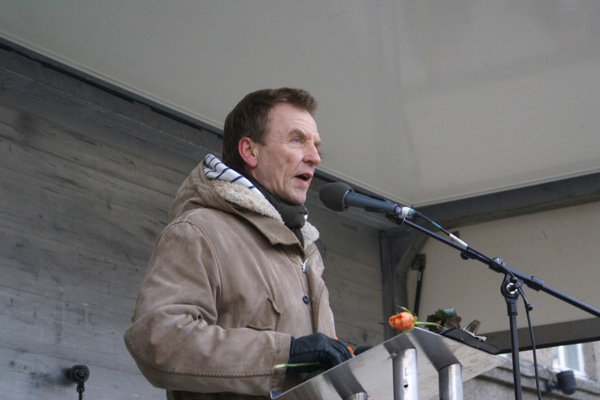Hör∂ur Torfason
Iceland's great reformer
Torfason's activism began decades ago at the age of 20, when he turned down a management position in the store he was working at because he didn't feel comfortable there as a closeted homosexual. After studying in Copenhagen, he felt that Iceland could be just as liberal as Denmark and in 1975 he came out as “Iceland's first gay man.” A household name at the time, Torfason went from popular singer-songwriter to an object of public ridicule overnight.
“Icelanders thought gay people were child molesters,” he told the audience. “Mothers used to pick up and hide their children from me.” The situation was so extreme that members of the organisation he established needed to wear hoods when speaking in public “about being a human.”
His effort has been emotionally rewarding, however. One member of the audience – a woman in her 60s – stood up and thanked him for being a key figure in the international movement that helped her come out as a lesbian and find the partner now sitting next to her.
After his gay rights activism, Torfason went quiet for decades. He only came crashing back into the public eye in 2008 when Paul Ramses, an asylum seeker from Kenya, was arrested and awaited deportation back to his certain execution. After giving the Minister of Justice a month to recover the situation, “Paul Ramses was not back in Iceland, but I was.”
Ramses was brought back to Iceland soon thereafter, but it was at this time (6 October 2008) that the Iceland Financial Crisis occurred. “The Prime Minister was a very typical politician,” Torfason says. “He didn't tell us anything when all the banks suddenly closed.”
The few people who initially turned up to these protests soon became thousands calling for the Government, the Financial Advisory Panel, and the Board of the National Bank to resign. But people began to lose hope when faced with a particularly cold winter and no response from officials.
With everyone returning after a Christmas break spent with family, Torfason had a PR revamp to undertake. First, he gave a two-minute speech on the value of silence. Immediately after this, he proceeded to protest by silently lighting candles in front of Parliament. It worked. Police officers tried to move him on because he was distracting people inside. “I moved halfway back to show them that I could listen to others,” he said.
On 20 January 2009 the movement's most significant demonstration occurred: the so-called “Kitchenware Revolution.” Armed with pots and pans, protesters surrounded Parliament on the Government's first day back after the Christmas break, making as much noise as possible with their kitchen utilities. Just a few weeks later, everyone they were calling out had resigned.
Torfason stepped down as the leader soon after, because “these movements need to become 'we,' not 'me'. I did it as an artist, not as a man seeking power.” The result of his work, however, was the later rewriting of the Icelandic constitution by Icelandic residents, some even chipping in via Facebook and Twitter.
When all the Government politicians were tried in court following the upheaval, they inevitably pleaded “I didn't know,” “I wasn't there,” “I wasn't told,” and other such variations on the theme of ignorance. As Torfason says, “all these people lost their memory.” Only the Prime Minister was found guilty of not alerting Ministers to the situation, but he was acquitted of anything that would imprison him.
So has anything changed?
“Before 2008 you weren't invited to parties if you talked politics,” Torfason said. “Today if you're invited, you get told not to but everyone does because that's what matters.”
“The main thing is that people woke up,” he concluded. “It takes time to change society, but you can.”







